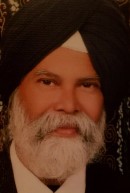My Word: One step closer to freedom from fear
 (Orlando Sentinel, May 15, 2013)
(Orlando Sentinel, May 15, 2013)
By Navtej Singh Khalsa
Years ago, President Franklin D. Roosevelt proposed four fundamental freedoms that all people everywhere ought to enjoy: freedom of speech, freedom of worship, freedom from want and freedom from fear. Of the four, freedom from fear is the most difficult to deliver.
This is true for society as a whole, as the recent terrorist bombing in Boston demonstrated. Crime in general creates fear. But fear is even more prevalent among any minorities whose appearance, accent or attire makes them stand out.
I’m a Sikh. I’m a member of the world’s fifth-largest religion. I’m easily identifiable because, as part of my spiritual commitment, I wear a turban. Ninety-nine percent of those with turbans in America are Sikhs. Sikh males stand out as a ready-made target for those who wish to instill fear.
Four days after the horrors of Sept. 11, 2001, a hate-filled man in Arizona killed a Sikh store owner, assuming the turban meant he was associated with the perpetrators of the 9-11 terrorist attack.
While being arrested, the killer said: “I’m a patriot and an American.” He misunderstood the identity of his victim as well as his own identity — because hate-engendered vigilantism is neither American nor patriotic.
Last year, a gunman entered a Sikh gurdwara (temple) in Wisconsin, killing six worshippers and critically wounding others. In February, a Sikh businessman in Port Orange had six bullets fired at his vehicle from a pickup. He was injured severely.
I could cite hundreds of such examples of attacks on Sikhs and other minorities. But there’s also good news. Although hate-filled people will always exist, they represent but a small fraction of an otherwise compassionate society.
My heart was touched recently when I attended a hate-crimes-prevention forum in Daytona Beach. Attendees included representatives from the U.S. Department of Justice, the FBI, the Florida Attorney General’s Office of Civil Rights, the Florida Department of Law Enforcement, local law-enforcement agencies, educational institutions, civil-rights and other community organizations and many concerned citizens.
To a person, those present were committed to solving the hate problem.
There’s no simple answer or quick fix. But what took place in Daytona is an encouraging step toward realizing Roosevelt’s dream.
Navtej S. Khalsa is regional director of the Sikh American Legal Defense and Education Fund and is on the executive committee of the Interfaith Council of Central Florida.
